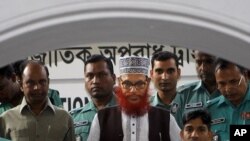Four decades after Bangladesh’s violent struggle for independence from Pakistan, the country has begun the first trial of those accused of war crimes. But observers have long raised concerns about how authorities are conducting the trial and whether the prosecutions are politicized.
On Sunday, senior leader of the opposition Jamaat-e-Islami party, Delawar Hossain Sayedee, became the first to stand trial for the 1971 crimes. A prosecutor charged him with crimes against humanity, such as genocide, murder and rape.
Sayedee is among seven senior Bangladeshi politicians charged with war crimes during the violent nine-month struggle that led to the country’s independence from Pakistan.
In addition to Sayedee, four other suspects belong to the top rungs of the opposition Jamaat-e-Islami party - Bangladesh’s largest Islamic party. Two belong to the main opposition Bangladesh Nationalist Party. They are accused of collaborating with Pakistani forces and committing atrocities during the conflict that killed an estimated three million people.
All of them maintain their innocence and accuse the government of Prime Minister Sheikh Hasina of carrying out a political vendetta against them.
Professor of politics at Dhaka University, Ataur Rahman, says there is wide acceptance that those guilty of war crimes should be brought to justice. But he says there are growing concerns about how the trials are being conducted and the credibility of those involved in meting out justice.
“They have some misgiving about the fairness of the trial, in terms of the process and whether that process is conforming to the international standard or not," Rahman said. "I think the government should take much more care than they did particularly in drafting some of the laws, in recruiting some of the prosecutors and in recruiting particularly the judges and the chairman of the tribunal.”
The tribunal was set up last year without United Nations involvement. Human Rights Watch has said that legal procedures fall short of international standards. There have been reports of defense lawyers and witnesses being harassed. Critics also say the rules on what evidence is permissible are at variance with international law.
British lawyer John Cammegh, whose help was sought by Sayedee’s defense team, has said that he was not allowed to participate in the trial or enter the country while it is happening.
The prosecutor has said the trials would be fair and are not aimed at “political axe-grinding.” The government also says its legal structure is competent enough to handle the trials.
Political analysts say, unless the trials are seen as absolutely fair, they could further heighten tensions in a country with an already divisive political culture.
Bangladesh Begins 1971 War Crimes Trial





